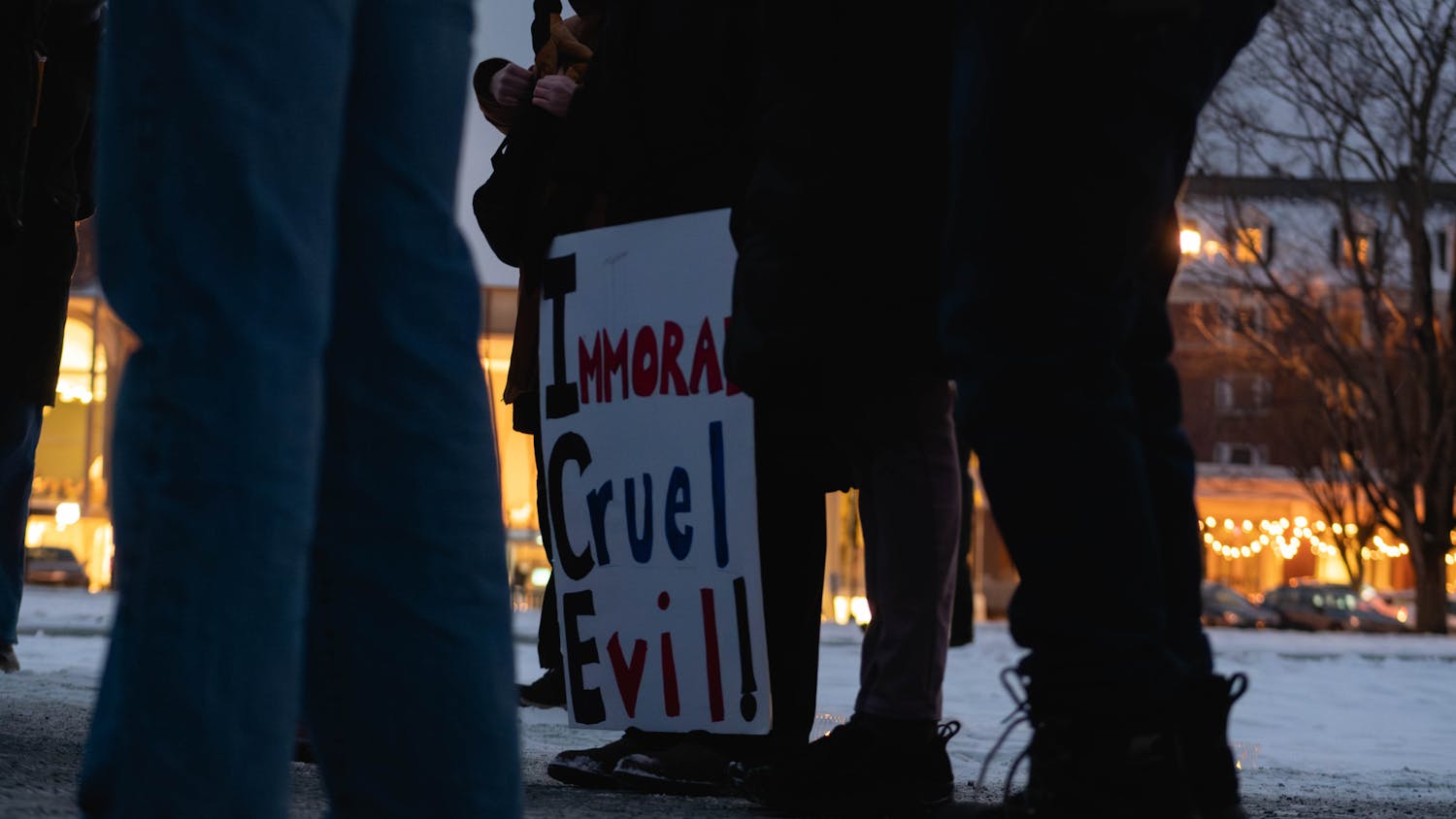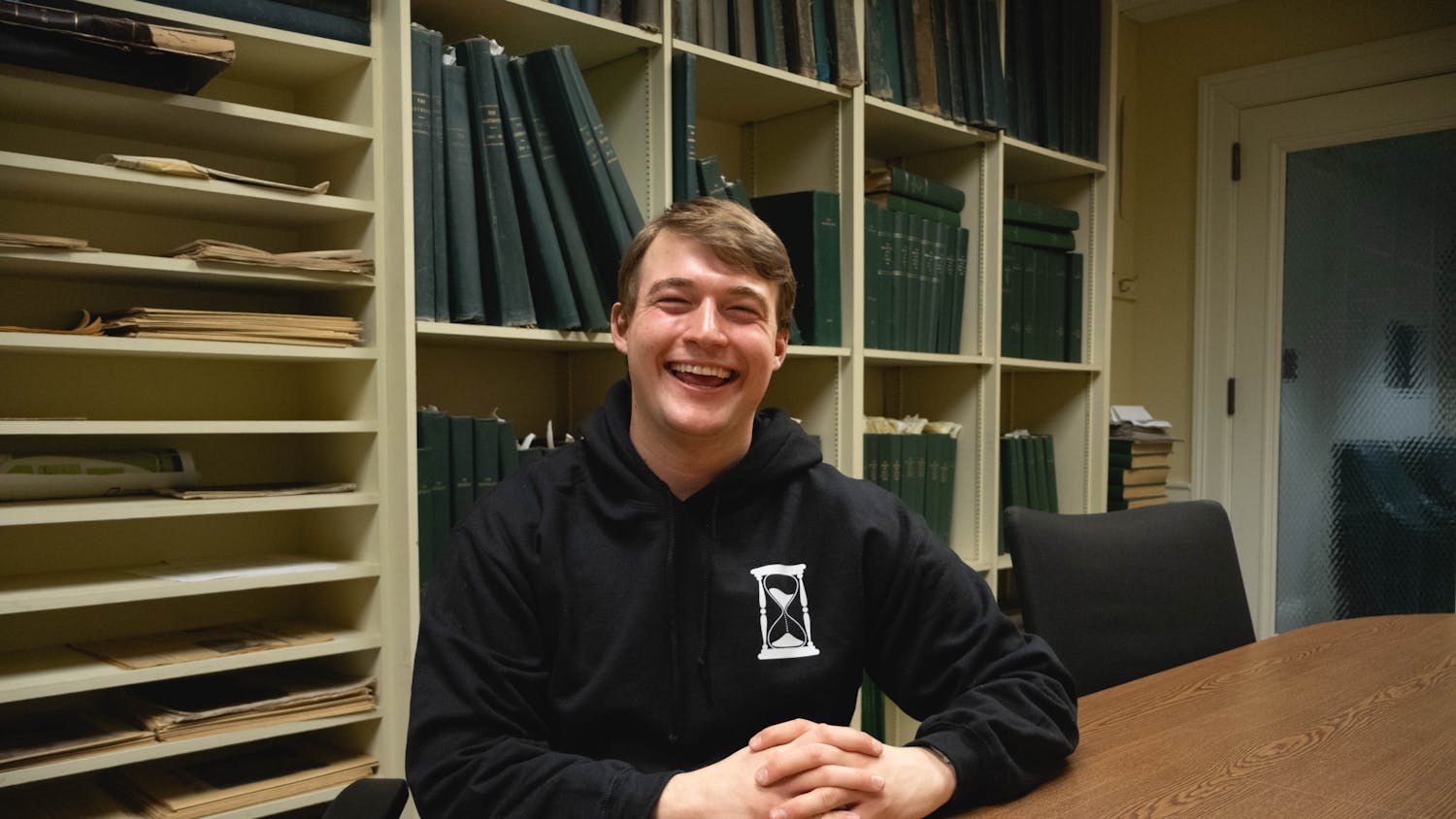Women's Field Hockey Coach Julie Dayton says she can read it on an athlete's face when the passion for the sport is running dry. "Usually when they're wavering like that, they end up quitting," she said.
For Dartmouth's 1,000 student-athletes, life is a balancing act. Schoolwork, extracurricular activities and maintaining a social life fill students' days to the brim -- and when you add training, games and road-trips, the calendars overflow.
Dartmouth academics are rigorous, and, from all indications, it is tougher than ever to be a student here. Few feel the pressure as intensely as athletes.
But despite the rigors they face, most student athletes successfully juggle their commitments. Attrition is low, and the grade point average for athletes is slightly higher than for non-athletes.
But not everyone does it all.
The students who quit are not the ones facing academic troubles; but those who are less committed to their sport are always in peril of quitting, Dayton said.
"Anyone who is admitted to Dartmouth can be a student-athlete," Dayton said. "If they screw up, it's because it's not important to them."
The plight of the student athlete is to please everyone: friends, professors, parents, coaches, and most of all, themselves.
The three Ss
Lacrosse Tri-Captain Andrea Krumholz '97 said athletes must struggle to balance the "Three S's": school, sport and social life.
To succeed at Dartmouth, athletes must make time for all three. For some, this means taking advantage of every second available.
Kelly Hannigan '97, who plays both field hockey and lacrosse, said her social life suffers during the season, since she spends Friday nights working. "When you're in season, social life is not a top priority."
Men's Basketball Coach Dave Faucher told the story of one basketball player who was not able to keep up with his academics because he made the mistake of making his social life his top priority.
Success "takes organization, discipline and priorities," he said.
But academics, it seems, are almost always a priority at Dartmouth. Few people forget that the scholar comes first in "scholar-athlete."
"Academics have to come first," Athletic Director Dick Jaeger said. "That's got to be the priority." Jaeger said the cumulative grade point averages and graduation rates of Dartmouth's athletes average higher than those of non-athletes.
Succeeding as a Dartmouth athlete means making use of every free moment. Hannigan has mastered the art of studying on the bus during road trips. "I've learned to put on a walkman on the bus and sit there and focus," she said.
Chris Welty '00, a golf player, said it is not easy to keep up with academics during his season. Welty said he missed his midterms due to golf matches this season.
"You always have the feeling that you didn't study enough, but you learn to deal with it," he said.
Sally Annis '97 is one of the small group of athletes whose excellence in the classroom is repeated in the gym. Annis, an engineering major with a 3.6 GPA, started at guard for four years on the women's basketball team, and she is an academic all-Ivy League player. Although she has faced no major problems, "occasionally one thing has to give." The first thing to go is her social life, she said.
Self-discipline and organization have enabled baseball and football stand-out Jon Aljancic '97 to keep his head above water. "It teaches you how to prioritize," he said. "You have to learn when something has to be done."
But adjusting to Ivy League academics can be a slow process.
Basketball star Courtney Banghart '00 said her adjustment to Dartmouth was not easy, because her high school did not prepare her for the rigors of Dartmouth. She said her basketball skills were a major reason she was accepted at Dartmouth.
"I didn't realize how hard it is to do the work here," she said. But after making it through one season, Banghart said she is "learning how to study."
Some students cannot handle all the pressures of athletics and the classroom. A few abandon their sport entirely. But Josie Harper, the Associate Director of Intercollegiate Programs, said attrition is not a serious problem.
"Attrition for athletes is very, very low," she said.
But there is more to college than sports, studies and socializing. Many athletes are involved in additional extracurricular activities.
Jaeger said athletes who quit a sport after being recruited are often lured away by the desire to pursue other interests. Freshmen are overwhelmed by the variety of activities at Dartmouth and sometimes "sense that other experiences might be more rewarding for them," Jaeger said.
How athletics raises GPAs
College Trustee David Shipler '64 said stereotypes of athletes as dumb are not applicable at Dartmouth.
"A lot of people tend to see athletics as a polar opposite to academics. People who are athletic are automatically assumed to be less intellectual," he said. "At a place like Dartmouth, that's simply false."
The combination of sports and studies produces a frantic pace for athletes, but the result is hardly what one might think: involvement in sports gives students' GPAs a boost.
Women's Lacrosse Coach Amy Patton said playing a sport helps athletes juggle their academic schedules.
Patton said as a student-athlete in college, she discovered her worst academic performances coincided with off-seasons. When she was injured and could not play, her academics suffered.
"If you are an athlete, your life has to be much more structured," she said.
"Athletics fosters organization and discipline."
Dartmouth athletes agree.
"I think that I perform better academically when I am involved in a sport," Annis said.
Women's Basketball Coach Chris Wielgus said athletes prioritize better than the average student because they are "more conscious of their time." Wielgus said her players receive academic support from their teammates.
"A lot of kids on our team don't put a lot of stock in their advisors," since many of these advisors doubt that athletics is a positive experience, Wielgus said.
Athletics also enables students to relieve school stress on the field or court.
Faucher said his players are better able to deal with stress because competing "makes them feel good" and lets them work off frustration.
Academic assistance
Coaches say they do what they can to keep students on track.
Head Football Coach John Lyons makes sure his players "get squared away" with academics, Jaeger said. Lyons said coaches are usually willing to bend practice schedules when students have especially heavy test loads.
Patton said she tries to stay aware of which students are falling behind in academics, and she does her best to remedy the problems, by allowing them to miss practices or helping them to find academic advice.
"They are here first as students and second as athletes," Patton said.
Patton said she tries to be sensitive to her athletes' academic conflicts, like midterms and finals. She said although road trips can be particularly destructive to students' academic careers, there are ways to ameliorate the situation.
For example, Patton said she and the lacrosse team have taken team trips to other colleges' libraries when they are away for weekend games. She said she always arranges a "team lab day," so her players all attend lab on the same afternoon.
She also designates certain rooms as "quiet rooms" when the team stays in hotels and allows for study time on bus trips.
"We make it work," Patton said. "You have to make sure you make them understand ... that academics are the most important thing."
Wielgus said some students are frustrated when they arrive at Dartmouth and discover they cannot consistently overachieve as in high school.
When a serious academic problem arises, Lyons said, resources are available to help athletes. He said the Academic Skills Center plays an integral role in helping athletes' keep their priorities straight.
The athletic department attempts to understand the pressures athletes face.
Harper said the athletic department conducts exit interviews of every graduating senior athlete. These confidential interviews probe senior for their experiences. She said the results of these interviews allow her office to continually review the lives of Dartmouth student-athletes.
"We try to keep track of what pressures kids are feeling over four years," she said.
Professors: Sometimes helpful
Athletics and academics seldom compete as directly as when there are scheduling conflicts between coaches and professors.
"Professors on the whole are understanding," according to football player Brian Larsen '97, a history major who plans to attend medical school. But others are "not at all understanding."
Conflicts with professors are "very difficult to deal with. There are some professors who don't see any positive benefits from athletics at all," he said.
Larsen said that because some professors are so unwilling to bend the rules, athletes have been forced to have the department buy alternative tickets for transportation to away competitions.
"I've seen that a couple of times in my career," he said. "A couple of them were difficult to the point that it was almost absurd."
Larsen said since he chose Dartmouth for its academics rather than for football, he has learned to cope with uncompromising professors.
Krumholz said she has never had a tremendous problem with her professors, because she has planned ahead. She said some of her teammates have had to miss games because of professors, due to Dartmouth's emphasis on academics over athletics.
Welty said unforgiving professors are, at least, usually frank about their reasons for enforcing deadlines and class schedules.
"Most professors if they aren't understanding are up front about it," he said. "They'll say that they're not going to make any special considerations for athletes."
Aljancic said he has had no major problems with professors, but has heard stories of teammates who "have really had a hard time."
Aljancic said he once was in class with a history professor who kept up with the football team and loved to discuss football with him.
Sean Maduck '00, who was recruited for the men's hockey team, said one professor would only allow a student to miss two classes during the term, in order to discourage athletes from missing class. Athletes in the class had to make flight arrangements separate from their teams in order to accommodate the professor.
"Some of the professors look down on it," he said. "Others totally respect it. Hockey means as much to a lot of people as the school does," he said.
No matter what they place as their top priority, all Dartmouth students-athletes are involved in a delicate balance. Jaeger said success in the process can translate into success later.
"It can be very frustrating," he said. "But it's actually great training for life."



